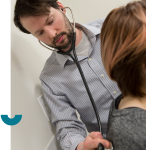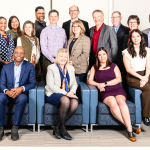Share
A Message from Your Council
Back to MessengerCPSA Council President Dr. Louis Hugo Francescutti
This month, I have two important topics to share with you. First, as a profession we have an important decision to make about the allotment of CPSA’s building fund. Council is seeking physician input to help decide how to invest an $8.5 million building fund reserve back into the medical profession. We have four options available to us and in April, we will ask each of you to vote on your preferred approach:
- Use the fund for CPSA operations and reduce the physician annual fee in 2022.
- Keep the fund invested and wait for CPSA’s current building lease to expire in 2029. At that time, re-evaluate building or buying office space for CPSA, depending on the economic environment.
- Find partners to match the amount and use the combined sum to fund programs, initiatives or research benefiting all physicians.
- A combination of the above options.
Considering the current economic environment, many physicians may wonder “Why not just give the money back?” Legally, we can’t refund the money since it was collected with annual fees, not as a separate levy. Canada Revenue Agency rules also prohibit CPSA from returning money or property to our members.
Council is ultimately responsible for making the final decision but I assure you, your feedback will have a tremendous impact on that decision. Please take the time to respond in April when we distribute the survey.
The second topic I want to discuss with you stems from a Zoom conversation I had recently with Dr. Kaylynn Purdy, a third-year neurology resident who asked me to provide some context to an interview I gave in 2011. I can honestly say I learn something from every interaction I have with our physician community and this was no exception.
In my 2011 interview, I made some comments and generalizations about female physicians and different generations of physicians and looking back, I understand why my words missed the mark. Dr. Purdy told me my comments led her and some of her colleagues to wonder how I could effectively represent female physicians and different generations of physicians in my role as CPSA Council President. I appreciate Dr. Purdy’s honesty—it gave me a lot of think about and helped me realize I owe our profession an explanation. Dr. Purdy encouraged me to share the details of our conversation with you and I’d like to use this forum to do so.
The intent of my 2011 interview was to talk about how the medical profession is changing and along with it, how the workforce distribution of physicians needs to evolve. Some examples of these changes are:
- Parents, of any gender, prioritizing leaves and time off to be more involved with their families.
- All ages and genders of physicians seeking more work-life balance, which may result in physicians working fewer shifts or reducing their hours.
I made a mistake in my 2011 interview when I singled out certain genders and generations unfairly and I’d like to acknowledge and correct this. I’d hoped to highlight how the way we practised medicine and managed our physician workforce 10 to 20 years ago needed to progress. A physician with a better work-life balance is good for patient care and our healthcare system. When I spoke about challenges facing our profession in 2011, I didn’t intend to suggest that one gender or one generation was better or worse than another, but rather that we need to evolve to meet the needs of all physicians, irrespective of age or generation. But regardless of my intent, it’s clear from the feedback I heard from Dr. Purdy and other physicians that the words I chose that day did not reflect my meaning.
In the last 10 years, I’ve learned a great deal about equity, diversity and inclusion, and I’ve worked to bring those principles to life in my work and do a better job explaining my perspectives. Being open to new perspectives and new ways of delivering quality care is a skill I’ve worked hard to adopt and I encourage every physician in Alberta to do the same—I know many of you already are. The medical profession in Alberta is very diverse and we can all learn a great deal from each other to help us improve patient experiences and outcomes.
In my January President’s Message, I encouraged you to consider ways you can be more kind in your interactions. I would like to thank Dr. Purdy for her kindness in meeting with me to share her perspective. Once again, I would like to challenge each of you to look for more ways to bring kindness to your daily medical practice and interactions with your colleagues.
In the coming ten months, I hope to have many more conversations with physicians in Alberta and I encourage you to reach out to me if there’s something you’d like to share or discuss.
























The building funds were collected with a specific intent. There is only one correct decision for council: if the funds cannot be refunded to those who contributed, the next best decision would be to apply to to reducing the licence fees for next year. At least most of those members who contributed would benefit.
Hi Norman, thanks for writing in. I appreciate you sharing your thoughts about what should be done with CPSA’s building fund. CPSA values the input of every physician, so please make sure to complete the building fund survey once it’s released in April. Thank you again and all the best.
Worthy comments but they do not address the final product of health care: improved “quality” life for all physicians (male and female) means less time looking after patients, and this at a time when the public continues to push physicians’ services to the limit in general, and most specific specialty, terms. For years the costing issues relating to training medical practitioners has kept the numbers below numbers required to provide reasonable, expected services and cover emergencies, etc. on a fair rotating basis. Thus, quality living, by the current definition of more home and personal time simply means reduced patient care time. We all support quality of life issues for both practitioners and patients; the balance is the issue and it is not appropriate at the present time.
I would like the College and other medical authorities, such as medical societies, to make it known that they are supportive of, and involved in, directing government to allow/permit/encourage/whatever increased student training for general medicine and most specialties. This issue has been evident for many years and gets little attention, or obvious action, from medical bodies with authority and standards-setting for current practice.
Hi Rod, thanks for reading Messenger and sharing your thoughts. First, I’d like to thank you for the work you’re doing to support patients and acknowledge your point that the last year has been challenging for all physicians. Improving physician’s quality of life, which ultimately results in better patient experiences, won’t happen overnight—especially in the midst of a pandemic—but it’s something our Council is committed to addressing within CPSA’s scope in the coming year.
Thanks you for being very open about these issues, including the evolution of professional practice and the need for our perspectives to contemplate these changes and evolve-typically with some lag time.
A suggestion for the available funds would be to address/research issues involving publicly funded health care for services with minimal or dubious levels of evidence. We are fiscally challenged and addressing low value care in an ethical and evidence supported manner will help preserve our public system. Cannabis prescribing involves a product with limited evidence for very limited indications, potential for serious side effects ,and “over the counter” availability. Strong commercial and social influence regarding its prescribing will require a strong and considered evidence base to rationally address these influences.
Hi Doug, thanks for sharing your perspective about what to do with CPSA’s building fund. When the survey is released in early April, I strongly encourage you to make sure your voice is heard by completing it. CPSA values the input of physicians and is keen on hearing from the profession. Thanks again and take care.
The money could be used to subsidise the exorbitant cost of counselling and rehabilitation for physicians who have experienced problems with various mental health issues, addictions and drug use who are required by the College to access such services and possibly for those who require residential rehabilitation after boundary violations if this is deemed to be helpful. The BC College funds all of these for members who are required to have them. The CPSA could possibly agree to do the same if there is excess cash looking for a home.
Hi Neil, thanks for reading Messenger and writing in. I appreciate you sharing your thoughts about CPSA’s building fund and I strongly encourage you to complete the building fund survey once it’s available in April. Thanks again and take care.
Hi Neil, in looking into your comment further and after connecting with CPSBC, we’ve confirmed that CPSBC does not offer coverage for residential treatment for regulated members. We still encourage you to share your thoughts by completing CPSA’s building fund survey once it’s released in April.